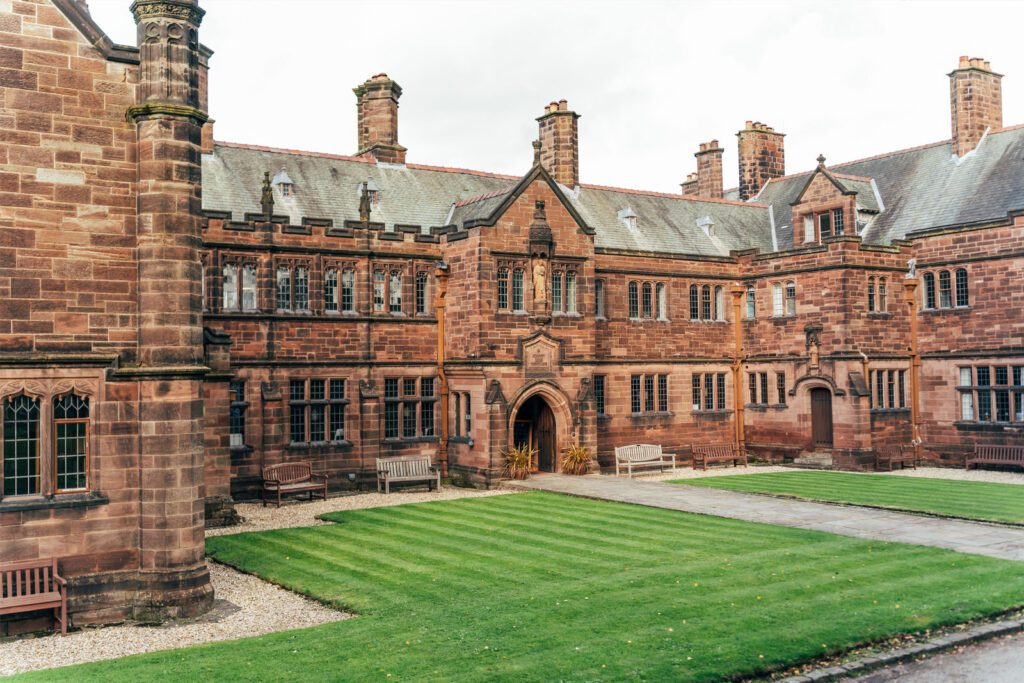Gladstone’s Library holds the archive of former Bishop of Woolwich, John Robinson. The archive is still in the process of being catalogued but part of the archive is available to be viewed. You can find out more about John Robinson and the archive below.
Bishop John Arthur Thomas Robinson was born in 1919 in the precincts of Canterbury Cathedral. He was the eldest of three children. His father, Reverend Arthur William Robinson, was an Anglican Canon.
Robinson was a foundation scholar of Marlborough College, and then attended Jesus College, Cambridge, in 1938 where he first studied Classics, then Religious Philosophy. He attended Trinity College, Cambridge, 1942-43 with a Burney scholarship, as a postgraduate and doctoral student. He gained a PhD in 1946. Robinson trained for ordination at Westcott House, Cambridge, and then served as curate of the Church of St Matthew’s, Moorfields, in the Diocese of Bristol from 1945 to 1948.
In 1947, Robinson married Ruth Grace. They originally met in Cambridge where Ruth gained a first in modern languages. Robinson left parish ministry to become Chaplain of Wells Theological College from 1948 until 1951, when he became fellow and dean of Clare College, Cambridge.
As visiting Professor in Harvard in 1955, Robinson gave lectures, which became the basis of his third book, Jesus and his Coming (1957). He was appointed one of the six preachers of Canterbury in 1958. In 1959 Robinson became the sixth Bishop of Woolwich. He was consecrated on 29 September 1959 and spent the next ten years there. He developed the Southwark ordination course during this time.
Robinson was elected as a Procter in 1960, and he spoke about radical subjects such as pastoral re-organisation, the ordination of women and capital punishment at the convocation of Canterbury (the synodical assemblies of the bishops and clergy), and at the church assembly. He was perceived as the foremost radical within the Church of England. In 1960, Robinson defended the D. H. Lawrence novel Lady Chatterley’s Lover in court during the obscenity trial of Penguin Books at The Old Bailey.
Four years after becoming Bishop, Robinson published his third book, Honest to God (1963). Robinson suffered from back pain from 1961 onwards and wrote this book whilst incapacitated. It was a highly successful, selling over 1 million copies. The progressive thinking expressed in the book caused controversy around the world and contributed to the development of a new liberal Christian Theology.
In 1969, Robinson returned to Trinity College, Cambridge as Dean of Chapel and a lecturer. He continued to write and travelled around the world delivering lectures. He delivered the Hulsean Lecture, ‘The Human Face of God’, in 1970 at Cambridge University. He became an Honorary Doctor of Civil Law (DCL) at the University of Southern California in 1981, and visiting Professor at McMaster University, Ontario, Canada.
Robinson died on 5th December 1983, having preached his final sermon in October that year, entitled ‘Learning from Cancer.’
The archive contains correspondence, articles and reviews by John Robinson, handwritten notes, records related to the John Robinson Memorial Fund, articles, reviews, and newspaper clippings about John Robinson, and research materials in the form of journals, booklets, photocopies and extracts of journals, newspaper clippings,
The archive consists of 29 archive boxes. Records are paper with some photographs.
The archive was deposited at Gladstone’s Library by John Robinson’s wife Ruth after his death. The year is not know but it is believed to have been around 2012.
